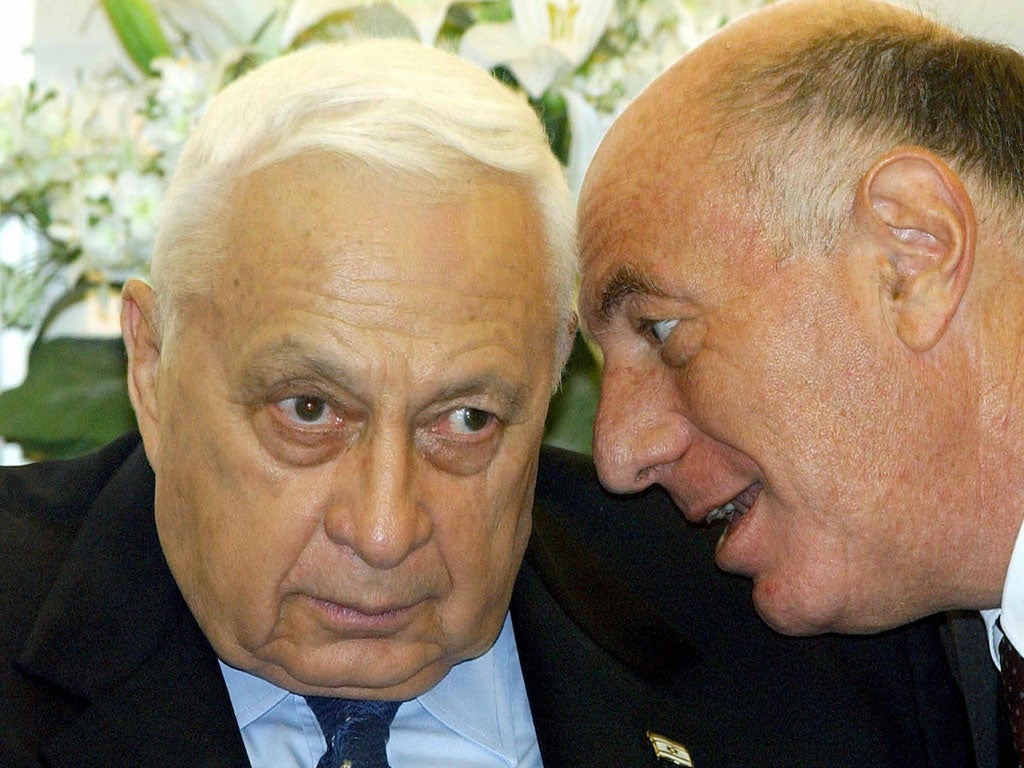Sharon's right-hand man attacks Netanyahu
Israeli Prime Minister accused of wasting opportunity for peace with Palestinians

The former top aide in Ariel Sharon's administration has blasted Israeli Prime Minister Benjamin Netanyahu for squandering an opportunity to make peace with the Palestinians, slamming a policy to marginalise the Palestinian Authority as both "dangerous and stupid".
The attack by Dov Weissglas, Israel's most influential political advisor during the Second Intifada, is all the more powerful coming from the man most closely attuned to the innermost political thoughts of Mr Sharon, the hardliner who was prepared to make difficult concessions before he suffered a massive stroke in 2006.
The former aide warned that Mahmoud Abbas, the moderate Palestinian leader, has been near-fatally weakened by a lopsided prisoner exchange deal to free Israeli soldier Gilad Shalit that strengthened the hand of Hamas, the Islamist rulers of Gaza, and said that it was in Israel's own interests not to jettison the best partners for peace that the country has ever had.
Mr Abbas, who has done much to restore the Palestinian cause in the eyes of the international community since the demise of Yasser Arafat seven years ago, is reportedly convinced the prisoner deal was timed to punish him for his drive last month to seek recognition of a Palestinian state in the United Nations.
Whether that was the case or not, Mr Weissglas said there should be a counterbalance to the prisoner exchange. "The present government's policy of weakening the PA [Palestinian Authority], if adopted, is both stupid and dangerous. I think approaching the UN was a mistake... but I prefer Palestinian resistance in diplomatic measures [to] other modes," he said. "The PA today is something we dreamed of 10 years ago."
Mr Weissglas joined Mr Sharon's government as bureau chief in 2002 during Operation Defensive Shield, the military offensive against the Palestinian uprising. At the same time, Israelis were facing suicide bombers on their own streets. Offering an insight into the man seen as one of the toughest leaders in Israel's history, Mr Weissglas said: "Sharon said he would resume negotiations after only seven days of quiet. Now we have had not seven days, but seven years of quiet."
It was, he said, to the credit of Mr Abbas and his Western-educated Prime Minister, Salaam Fayyad, that they were able to stop the terror and convince Palestinians that "non-violence pays". "A great deal is down to Israel's efforts, but a great deal is also down to Palestinian efforts. In my view, as a graduate of those five horrific years, the present Palestinian government is the best," he said. "I know the efforts they [Mr Abbas and Mr Fayyad] made, how difficult it was to stand up and speak loudly and clearly against terror when it was very unpopular in Palestine."
But, he warned, the current calm is fragile, and a leader who is unable to take "courageous" decisions will end up adopting a "more radical position" and demonstrating "less flexibility", potentially paving the way for renewed violence. "Nobody feels like going back to the old days, but this stability [in the West Bank] is tied together with shoelaces. It's like a leaf: all you need is one blow and it's gone," he said.
It is the Israeli military, fearful that the PA could collapse entirely leaving Israel responsible for West Bank security, that is calling loudest for Mr Netanyahu to bolster the PA, either by releasing prisoners affiliated to Fatah, Mr Abbas's party, or by transferring more territory in the West Bank to Palestinian control.
But the appeals have so far fallen largely on deaf ears, and Avigdor Lieberman, Israel's ultranationalist Foreign Minister, claimed this week that Mr Abbas was the "greatest obstacle" to Middle East peace for trying to undermine Israel internationally in the UN, and that his resignation would be "a blessing".
Profile: Dov Weissglas
A lawyer, Dov Weissglas (here with Ariel Sharon) became friends in 1983 with Israel's hawkish prime minister, representing him in the investigation of his role in the massacres of Palestinians at the Sabra and Shatila camps in Lebanon that nearly ended Mr Sharon's career. Nearly 20 years later, Mr Sharon brought Mr Weissglas into his government (2001-06) as bureau chief during the Second Intifada, and he was his right-hand man until Mr Sharon's massive stroke in 2006.
Subscribe to Independent Premium to bookmark this article
Want to bookmark your favourite articles and stories to read or reference later? Start your Independent Premium subscription today.

Join our commenting forum
Join thought-provoking conversations, follow other Independent readers and see their replies